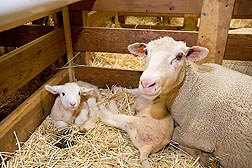This page has been archived and is being provided for reference purposes only. The page is no longer being updated, and therefore, links on the page may be invalid.
| Read the magazine story to find out more. |
|
|
Natural Selenium Coproduct Good for Sheep
By Sandra AvantFebruary 14, 2012
A more cost-effective, longer-lasting selenium supplement for livestock may soon be available, according to a U.S. Department of Agriculture (USDA) scientist.
Animals as well as humans need selenium, a trace mineral and component of antioxidants, to stay healthy. Inadequate selenium in sheep reduces conception rates, increases neonatal mortality, and in some instances, causes "white muscle disease"-nutritional muscular dystrophy. Selenium deficiency in sheep and cattle costs livestock producers an estimated $545 million annually in losses and affects livestock in more than 35 states where regions are deficient in the mineral.
Agricultural Research Service (ARS) animal scientist Bret Taylor at ARS' U.S. Sheep Experiment Station (USSES) near Dubois, Idaho, along with researchers at North Dakota State University, studied the effects of a milling coproduct, derived from selenium-rich wheat harvested in South Dakota, on ewes and their lambs.
ARS is USDA's chief intramural scientific research agency, and this research supports USDA's priority of promoting international food security.
The scientists added the natural coproduct to diets fed to a group of ewes during their last 40 to 50 days of pregnancy and to another group during the first 19 days of lactation. Pregnant sheep passed the supplemental selenium to their fetuses, while lactating ewes delivered it to offspring through their milk. Both of these groups maintained an adequate selenium status six to 10 times longer than sheep that received sodium selenite, the most commonly used inorganic form of selenium.
By using this feeding strategy, livestock producers will be able to eliminate the cost of delivering selenium supplements to sheep in hard-to-reach regions, especially in the West where selenium in some soils is lacking or unavailable for absorption by vegetation that animals eat, according to Taylor.
Sheep can be fed the selenium coproduct before being released to graze selenium-deficient range. The coproduct will provide enough to meet their selenium requirement, according to Taylor. Animals will not need any additional supplements until they return for lambing the following year.

